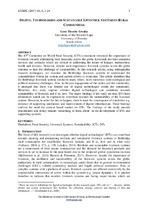Digital technologies and sustainable livestock systems in rural communities
Abstract
The 43rd Committee on World Food Security (CFS) convention reiterated the importance of
livestock towards eliminating food insecurity across the globe. Livestock provides extensive
services and products which are critical in addressing the issues of hunger, malnutrition,
health and diseases. However, despite such importance, livestock systems across the globe
continue to face the challenge of sustainability. In this research article, using ethnographic
research techniques, we examine the Beitbridge livestock systems to understand the
vulnerabilities within the system and current efforts to overcome. The article identifies that
the Beitbridge livestock system, similar to many others, faces numerous socio-ecological and
political economy challenges. Also, in the past engagement of the author and the community,
it emerged that there was limited use of digital technologies within the community.
Therefore, this study explore whether digital technologies can contribute towards
sustainability of livestock and if so, how. The major findings of the study are that, DTs have
affordances which can be exploited to contribute towards the sustainability of the livestock
system. However, in order for this to happen, there is need for convergence of conditions e.g.
presence of supporting institutions and improvement of digital infrastructure. These findings
confirm the need for context based studies on DTs. The findings of the study provide
practitioners and policy makers ‘something to think about’ in the development of DTs and
supporting systems.

